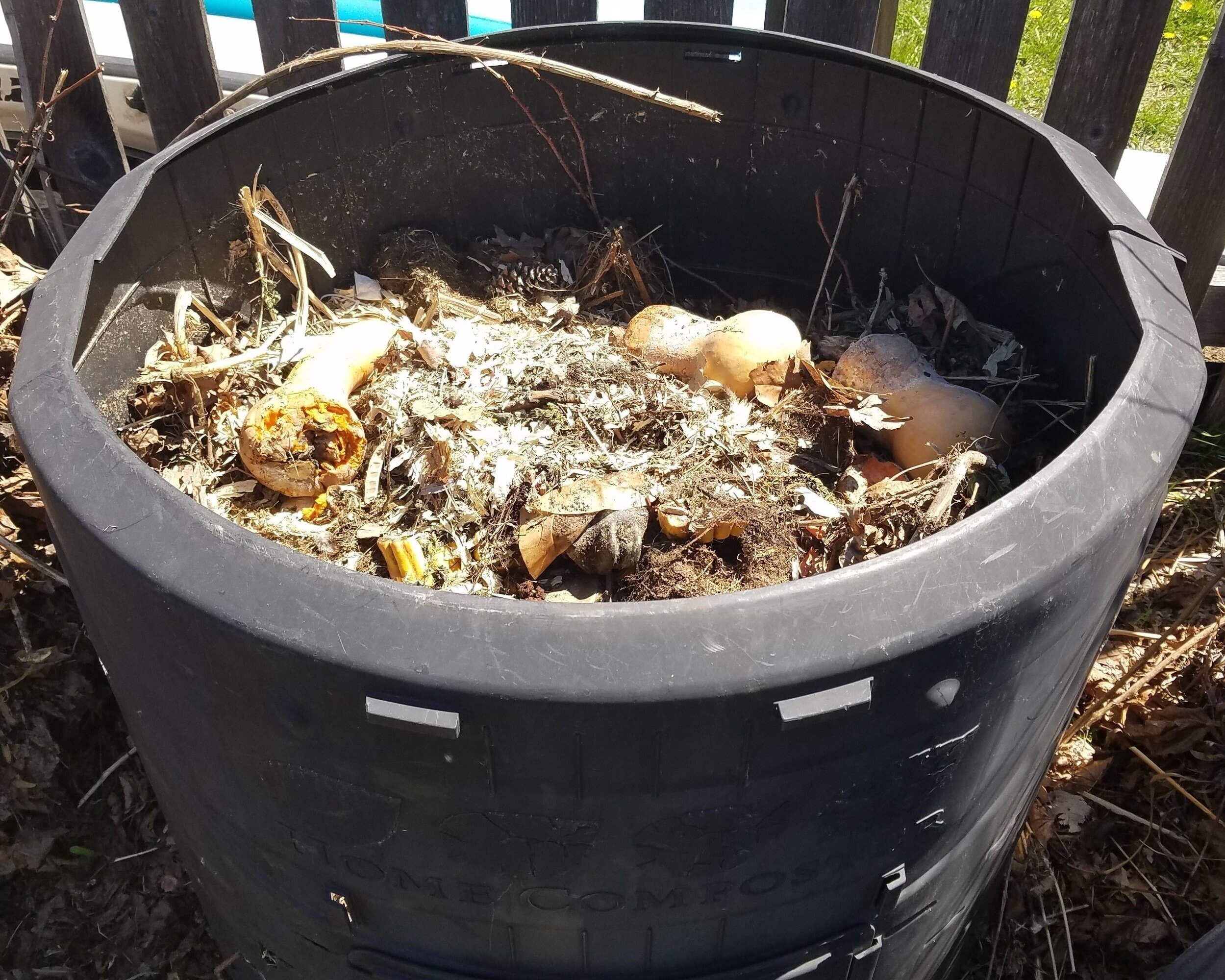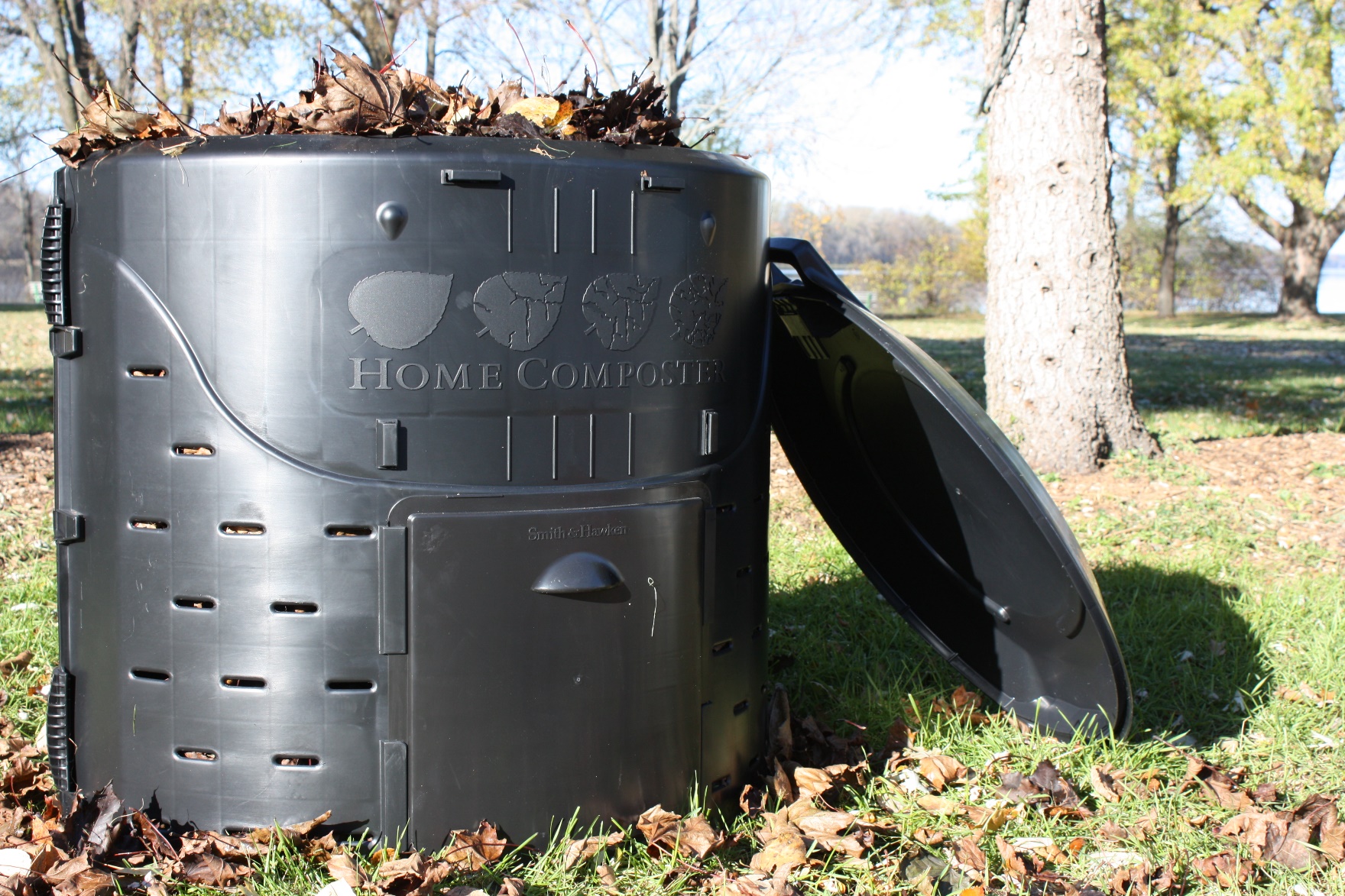home composting
Composting yard and kitchen materials is the easiest and cheapest way of taking responsibility for some of our own waste. It’s kind of like recycling! This material is often referred to as “organics,” which means carbon-based. It doesn’t have anything to do with the type of agriculture used to grow food, but rather the chemical make up of the items. It can also be thought of as material that was once-living.
Did you know that organics make up 25% to 30% of our solid wastes nationwide?
That’s one-third of what we send to landfills, and it could be recycled instead!
When composted, organics are broken down aerobically (that means with oxygen) to a soil-like material that is nutrient dense and acts as an amendment to a growing medium. Whether you are growing ornamental flowers or vegetables, adding compost to your soil ensures the best possible growing conditions for your plants.
Composting meets the criteria of the three R's: Reduce, Reuse and Recycle. Through composting, the amount of waste sent to the landfill is Reduced, the organic matter is Reused, and it is Recycled into a useful soil amendment.
Purchase a Home Composter bin or Kitchen pail:
Compost bins and pails are available for purchase year-round at the Marathon County Solid Waste Department Office, the same location as our landfill.
Please get in touch with Amberlea at least 24 hours in advance to place an order. Contact info below.
Phone: 715-446-3101 ext.103
Email: Amerlea.Kaiser@co.marathon.wi.us
Bin $55 Pail $25 (scroll down to learn more)
The Home Composter is recommended by top backyard composters.
Why PURCHASE one of our COMPOST bins?
The Home Composter bin is made of 100% recycled material.
It is sturdy and lightweight but holds 17 cubic feet* of material! The lid is wide, lockable, and detachable, making it very easy to add and remove material. The sliding doors at the bottom of each side piece allow for an up-close look at the breakdown process towards the bottom of your pile. The Home Composter makes it easy for anyone to get started with composting in their backyard! *actual size is approx. 30" tall x 32" wide
Kitchen Katcher Compost Pail
And why the kitchen pail?
The kitchen compost pail we sell has a lid with a handy ring at the top to grab, but more importantly it ‘lips over’ the pail to create a seal. This helps prevent smells coming out, or fruit flies gestating. No carbon filters needed! Made of stainless steel, it is easy to clean, retains no odor or color, and should never chip or crack. It has a capacity of 1.3 gallons and because of its sleek design, can match any kitchen. Collecting kitchen scraps to take out to your compost bin couldn't be any easier!
Composting Information & Resources
Today, we have many environmental issues to consider and sometimes we wonder "What can I do as an individual to contribute to the solution?" or "What did I do to help cause the problem?"
Back Yard Composting Video
Every day we make decisions; how we dispose of our household waste, deciding on what types of products to buy (recyclable, made from recycled content, small amounts with more packaging, large quantities with less packaging), should we take the car, car pool or possibly walk to our destination.
Home composting is an easy step for each of us to take to begin the process. It takes about 10-20 minutes per week, uses a small amount of yard space and provides us with a opportunity to get rid of something we have so much of (kitchen scraps and yard debris) and create something of greater value (compost).
Presentation Slides from Backyard Composting Workshop in Weston - CLICK HERE for the presentation slides
Back Yard Composting Basics Flyer
How to Compost
Grass Cycling:
Grasscycling simply means leave the clippings fall where they may. Grasscycling contributes to a healthy lawn by returning nitrogen (about 20% - 40%) and other nutrients to the soil. Clippings break down in about 7 to 14 days. They act as top dressing fertilizer and help keep your lawn green and healthy. Grasscycling also helps the soil hold more water and resist erosion. Best of all, grasscycling saves time!
HINTS FOR PRACTICING "GRASSCYCLING":
Mow often and cut less than 1/3 of the grass growth when mowing.
Mow when conditions are dry.
Use a sharp mower blade.
Avoid overuse of harsh chemical and fertilizers.
Water your lawn less frequently, but for long periods of time.
Mulching mowers that grind grass clippings can be used, but are not necessary.
When grasscycling is done well, you don't notice the clippings - only the results. Your lawn looks neat and well groomed.
OTHER USES:
Use as surface mulch around vegetables or flowers to inhibit weed growth and retain soil moisture. Keep at least 2" away from young plants to avoid "burning" the new growth.
Put grass clippings in your compost pile to add extra nutrients.
Recipes for composting:
SHOPPING LIST:
Green yard waste: grass clippings & weeds.
Brown yard waste: leaves, small brush, & twigs.
Worms
LAZY PERSON'S COMPOST:
Ingredients: green and brown yard waste, water as needed.
Directions:
In a heap, layer your yard waste as it accumulates. For faster composting, chip it up first.
Water so compost is kept as moist as a wrung-out sponge.
In a year to 18 months, the material at the bottom and center of the pile will be dark, crumbly compost. Sift, and use the uncomposted material to start a new batch.
FAST COMPOST:
Ingredients: green and brown yard waste, water as needed.
Directions:
Mix one part green yard waste with two parts brown to form a pile (an average size is 4' x 4' x 4.' For fast composting, chop it up first with a hoe or lawn mower.
Mix in one inch of soil
Keep the pile as moist as a wrung-out sponge
Turn the pile every week to let air in
Finished compost will take between 4 weeks and 1 year, depending on how often you turn it and how well you maintain the moisture of the pile.
What can be composted:
Grass clippings
Leaves
Weeds
Garden debris
Twigs
Small brush
Sawdust
Wood chips
Egg shells
Coffee Grounds
Tea leaves / bags
Hay
Manure from herbivores (plant eaters)
Paper
Fur and hair
Natural fibers and feathers
Food scraps (only if buried)
What Not to compost:
Meat, bones or fat
Persistent weeds
Whole branches or logs
Thorny branches
Charcoal briquette ash
Sawdust from treated wood
Dairy products
Oils - cooking & salad
Pet or human waste
Diseased plants (unless fast composted)





